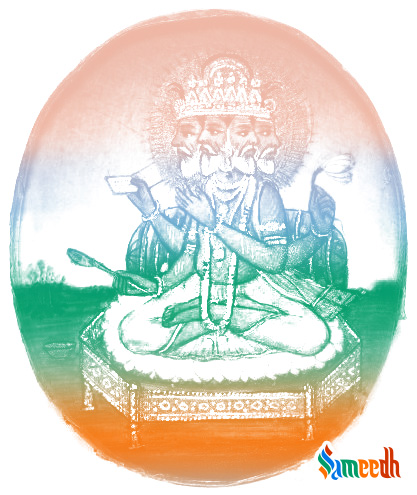The significance of the supreme Hindu deity of creation

A roundel of Lord Brahma, the creator of the universe; Image Source: Wellcome Library, London
Brahma is one of the three supreme Hindu deities, Trimurti, along with Shiva and Vishnu. He is known to be the creator of the Universe, Brahmand, and all entities. He is renowned for his all-encompassing knowledge and wisdom. Brahma is often mistaken for Brahman, which is the supreme cosmic force according to Hindu religious philosophy. Brahma is the personification of the spirit Brahman. Brahma is not a widely worshipped deity as the frequency of his mentions in the Hindu scripture is reduced and eventually replaced by other deities. In the present day, only a handful of temples are dedicated to this creator of the Universe, such as the Pushkar temple in the Indian state of Rajasthan.
Origin
There are various explanations across scriptures for the birth and origin of Brahma. It is believed that he created water and planted his own seed in it. The seed then formed a golden egg, also known as the Hiranyagarbha, from which emerged Brahma. Vaishnavas, worshippers of Vishnu, claim that Brahma originated from the lotus that grows from Vishnu’s navel and hence the term Nabhija, the one born from the navel, is also associated with him.
Physical form
Brahma has 4 heads, each representing the 4 Vedas, Hindu religious scriptures. Initially, Brahma had 5 heads. He had created Shatrupa, a beautiful female deity and immediately upon her formation, he was infatuated with her. She tried avoiding his leering by travelling to different directions but each time she attempted that, a new head was developed. After all four fundamental directions when four heads were brought into existence, she tried going through his head but to her dismay, a fifth one appeared on the top of others. Shiva found the nature of this obsession incestuous and chopped off the head in anger.
He has 4 hands holding various sacred objects in various ancient pictures. There is a Mala, a chain made of Rudraksh, stone fruit, prayer beads to help Brahma keep a track of time in the Universe. A lotus, Vedic texts, vase of pure water, a circular energy disk or Chakra. He has also been spotted holding a spoon or a scepter for adding oil or ghee to sacrificial pyres preaching the similar nature of Brahma. His white beard is proof of his elongated existence.
Primary Creations
His primary creations were the ten Prajapatis, literally meaning the fathers of humans, namely, Daksh, Narad, Marichi, Atri, Angiras, Pulatsya, Pulaha, Kratu, Vasishta and Bhrigu. He also gave birth to the Saptrishis, the seven great saints to aid him with creating and expanding the Universe. The Prajapatis and Saptrishis were better known as Manasputras, meaning the sons of mind as they were the product of Brahmas’ mind and not body, as children ideally are.
Saraswati is Brahma’s wife, the Hindu goddess of knowledge, learning, speech, art and music. Like the Trimurti, she along with goddess Laxmi and Parvati consist of the Trivedi, 3 goddesses.
Brahma’s vehicle or Vahan is the Swan. This sacred bird is believed to separate the mixture of water and milk into its specific constituents. It also indicates how everyone is eligible for justice regardless of their circumstance. Which implies imbibing the ability to tell the good apart from bad or evil and accordingly either following its way or detaching from it.